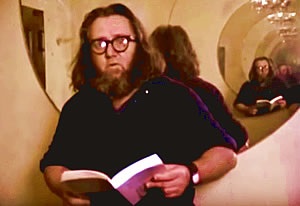De Amerikaanse dichter Ted Berrigan werd geboren op 15 november 1934 in Providence, Rhode Island. Na de middelbare school bezocht hij een jaar lang Providence College voordat hij in het Amerikaanse leger ging. Na drie jaar in het leger, beëindigde hij zijn universitaire studies aan de Universiteit van Tulsa in Oklahoma, waar hij in 1959 een BA in Engelse taal behaalde en in 1962 net kort kwam voor de vereisten voor een MA. Berrigan was een prominente figuur in de tweede generatie van de New York School of Poets, waartoe ook Jim Carroll, Anselm Hollo, Alice Notley, Ron Padgett, Anne Waldman, Bernadette Mayer en Lewis Warsh behoorden. Hij heeft samengewerkt met Padgett en Joe Brainard op “Bean Spasms”, een werk dat belangrijk is bij het afwijzen van traditionele concepten van eigendom. Hoewel Berrigan, Padgett en Brainard allemaal individuele gedichten schreven voor het boek, en samengewerkten bij vele anderen, werden er geen auteurs opgenomen voor individuele gedichten. De dichter Frank O’Hara noemde Berrigan’s meest significante publicatie, The Sonnets, ‘een feit van de moderne poëzie’. Sinds de oorspronkelijke publicatie in 1964 izijn “The Sonnets” beschouwd als een belangrijke esthetische verklaring van zowel de New York School als de 20e eeuwse Amerikaanse poëzie als geheel, beinvloed als zij zijn door de eerste generatie New York School dichters (in het bijzonder John Ashbery, Frank O’Hara en Kenneth Koch), de compositietheorieën van John Cage, de filosofieën van Alfred North Whitehead en door het gebruik van een door de tijd heen bewezen poëtische vorm, die variëert van William Shakespeare tot Edwin Denby. Berrigan was getrouwd met Sandy Berrigan, die eveneens dichtte, en met wie hij twee kinderen kreeg, David en Kate. Berrigan en zijn tweede vrouw, de dichteres Alice Notley, waren meerdere jaren actief in de poëziescène in Chicago en verhuisden vervolgens naar New York City, waar hij diverse tijdschriften en boeken bewerkt.
The Sonnets: I
His piercing pince-nez. Some dim frieze
Hands point to a dim frieze, in the dark night.
In the book of his music the corners have straightened:
Which owe their presence to our sleeping hands.
The ox-blood from the hands which play
For fire for warmth for hands for growth
Is there room in the room that you room in?
Upon his structured tomb:
Still they mean something. For the dance
And the architecture.
Weave among incidents
May be portentous to him
We are the sleeping fragments of his sky,
Wind giving presence to fragments.
The Sonnets: III
Stronger than alcohol, more great than song,
deep in whose reeds great elephants decay,
I, an island, sail, and my shoes toss
on a fragrant evening, fraught with sadness
bristling hate.
It’s true, I weep too much. Dawns break
slow kisses on the eyelids of the sea,
what other men sometimes have thought they’ve seen.
And since then I’ve been bathing in the poem
lifting her shadowy flowers up for me,
and hurled by hurricanes to a birdless place
the waving flags, nor pass by prison ships
O let me burst, and I be lost at sea!
and fall on my knees then, womanly.
A Certain Slant Of Sunlight
In Africa the wine is cheap, and it is
on St. Mark’s Place too, beneath a white moon.
I’ll go there tomorrow, dark bulk hooded
against what is hurled down at me in my no hat
which is weather: the tall pretty girl in the print dress
under the fur collar of her cloth coat will be standing
by the wire fence where the wild flowers grow not too tall
her eyes will be deep brown and her hair styled 1941 American
will be too; but
I’ll be shattered by then
But now I’m not and can also picture white clouds
impossibly high in blue sky over small boy heartbroken
to be dressed in black knickers, black coat, white shirt,
buster-brown collar, flowing black bow-tie
her hand lightly fallen on his shoulder, faded sunlight falling
across the picture, mother & son, 33 & 7, First Communion Day, 1941–
I’ll go out for a drink with one of my demons tonight
they are dry in Colorado 1980 spring snow.

Ted Berrigan (15 november 1934 – 4 juli 1983)
